
We share our lives and homes, but have you ever wondered what life is like for a migrant domestic worker in Singapore?
Please welcome Karien van Ditzhuijzen from HOME with exciting news about an important new book recently published in Singapore. She also speaks with one of the book’s contributors.
Many of us are thankful and appreciative to the women that help run our households smoothly, and we try to treat our helper fairly. But do we know much about her childhood dreams, or the reasons why she left her country and family behind to come and work in Singapore?
Did she feel homesick, or cry herself to sleep because she missed her children when she first arrived? Was she as comfortable with the employers she worked for before you? These are intimate questions, and not ones every employer is comfortable asking.
This March HOME published the book Our Homes, Our Stories, which contains 28 real-life stories written by migrant domestic workers in Singapore. The video above shows unique behind the scenes footage from how the book was made, interviews with those involved, and shots of the writers reading from their own work.
The book “Our Homes, Our Stories” is available at HOME offices, fairs, and several bookstores in Singapore. An e-book version is available too.
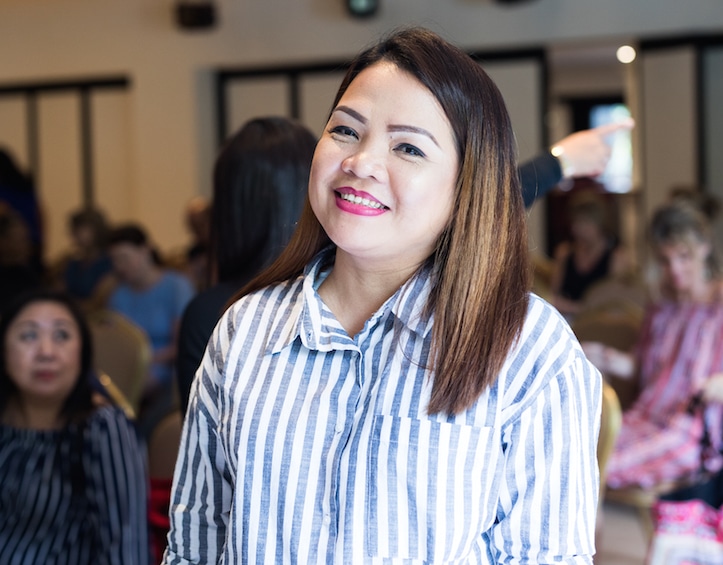
We spoke with one of the book’s contributors, Robina, or Bhing as her friends call her. Bhing’s story, “I love my job”, shows how, with the right employers, being a domestic worker can be a dream job.
Still, Bhing’s experiences as a domestic worker in Singapore for more than two decades also show that the life of a domestic worker is never easy. Far away from friends and family, living in someone else’s home, a domestic worker is dependent on the benevolence of her employer. And Bhing knows a lot about domestic worker ill-treatment, too: she has been a volunteer for HOME’s Sunday helpdesk for years.
She also gives lectures and visits schools and events on behalf of HOME. I met Bhing through my own work with HOME, and was instantly impressed with her passion, and how, despite her own busy job, she commits so much of her free time to advocating for migrant workers’ rights, and helping others that are less fortunate. Bhing is truly an inspiration! I asked her some questions about her story in ‘Our Homes, Our Stories’, and her work for HOME.
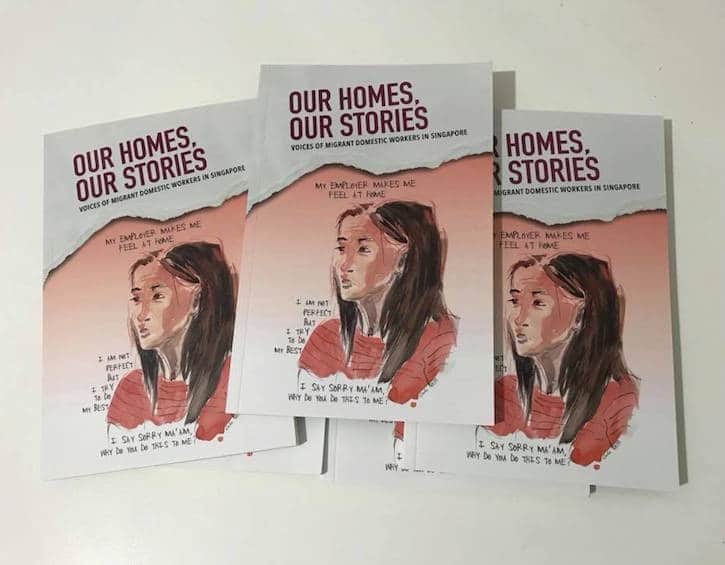
What was it like for you to be a writer featured in the ‘Our Homes, Our Stories’ book?
For me, it was a dream come true. This project has inspired me to do even more to spread awareness on domestic workers rights. Having been a domestic worker in Singapore myself for over two decades, I have gained a lot of experience with different employers. I like sharing my experiences with my fellow domestic workers, and giving them ideas on how to deal with their own problems at work.
Being a domestic worker is not as easy as some people think. But I have managed to last for 22 years, and I am still working here. Mainly because I love what I do. I love my job.
Your story is great as it shows the different sides of domestic worker life, both good and bad. What was it like to write so openly about your life?
I love to write, and to compose poems, too. I like to share how I feel. Usually I write when I am sad. Writing about my own life was different. I was very excited when I was doing it, but it wasn’t easy. I kept thinking of my previous employers, with whom I had good relationships. I started to miss them. And then I recalled my bad experiences with other employers.
As a domestic worker, we never know what kind of employer we will get next. When I focused on those parts, I felt stressed. And when I thought back to my first year here, I felt nostalgic. I did not know anything then. I said “yes” to everything my employer asked me to do. Because at the time, I did not know where to get help and whom to talk to.
And two decades later, you are usually the one giving help and advice. Can you tell us about your work for HOME?
I volunteer with the HOME Helpdesk every Sunday. Sometimes I receive calls during the week, too. At the helpdesk I advise other domestic workers that have problems with their employers. Being part of this helpdesk taught me about humility. Listening to other people’s problems made me realise how blessed I am. That is why I do this. I love my volunteer work like I love my day job.
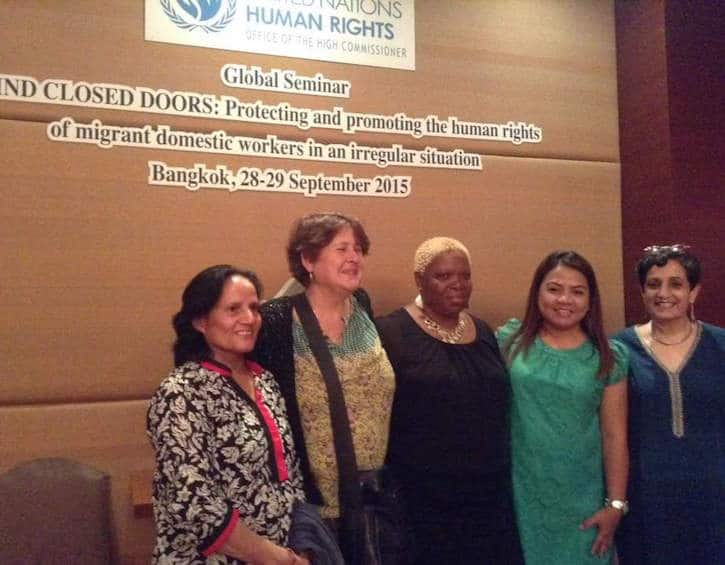
Do you do any other volunteering?
I have had so many amazing experiences volunteering with HOME. When I just started, they sent me to Thailand for a United Nations conference about undocumented migrant domestic workers. I gave a presentation there.
I have also been a ‘human book’ in the Human Library SG. As a human book, readers ‘read me’ by asking me questions. That way I could introduce HOME to my readers and spread awareness on how to treat domestic workers right. I often represent HOME at panel discussions too, for instance last month at a ‘Difficult Woman’ panel discussion. Sometimes I do interviews with students, or give school talks.
That is a very impressive list! How do you have time for this next to your own job as a domestic worker?
With all these things that I do, my purpose is helping my fellow domestic workers. Every platform is important for me. It can take time to prepare for presentations but it’s all fine. This is not about me, this is about the things that I can do to help others. Because I know that I have the will and courage to do this.
So let’s talk about the book. What does it mean to you?
I learned a lot being part of the ‘Our Homes, Our Stories’ project, both writing the book and selling and promoting it. It has made me realise that we can help others if we have the courage to talk, to narrate our stories. My dreams should not stop the moment I became a domestic worker. There is hope! There are so many things us domestic workers can do to have a meaningful life here. Many people think that we are simply unskilled, un-driven, have no ambition, but we can prove them wrong with projects like this one. We are motivated by the people who believe in us, who treat us fairly and who value our worth.
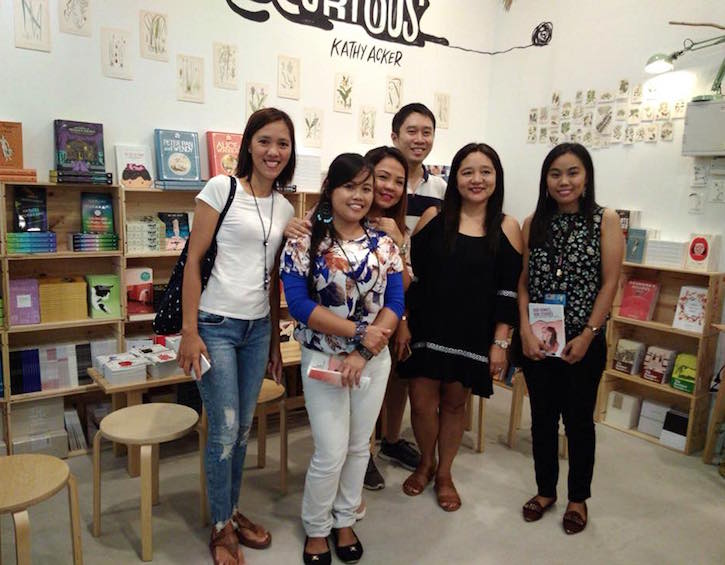
Who did you write it for, who do you hope will read it?
I hope that both domestic workers and employers will read this book. Because our stories are raw and real. Each one of us has a different story to tell that other domestic workers can relate to. They can learn from our experiences.
And really all employers need to read this book. Reading our stories will make them understand us more. This book will be an eye opener for them.
Did you tell your own employer about the book? What did they say?
My employer and I were having a conversation one day, when I mentioned the book to her. I told her that I am one of the writers, and that my story is about all my experiences in Singapore. She was very happy and excited, and told me that she is very proud of me. She bought the book and attended our launch party, too.
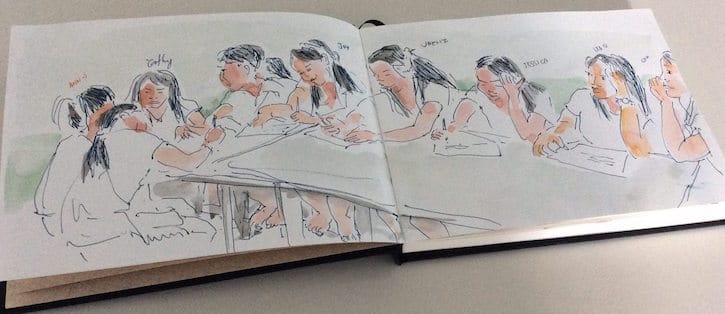
Is there an important message you wanted to bring across with your story?
The most important message of my story is to love what you do. I love my job and I am proud of being a domestic worker. If we love what we are doing, there will be good relationship between our employer and us. If we love our job, we will have a very good understanding of it. We will not allow anyone to take it away from us. Because it is our bread and butter. But we also need to know our basic rights, and what we need to do when an employer is abusing us. We need to have the courage to speak up. And remember that there’s always hope.
Why do you think an organisation like HOME is important?
HOME helps so many domestic workers. HOME gives them a reason to fight, because this organization understands and supports them. As a volunteer at HOME, I have experienced how many domestic workers rely on this organization. I can feel how satisfied they are after we give them advice. HOME is where the help is!
If you would like to read Bhing’s full story, please purchase a copy of the book. It is for sale at HOME offices, and selected bookstore in Singapore as well as online.






 View All
View All





 View All
View All









 View All
View All





